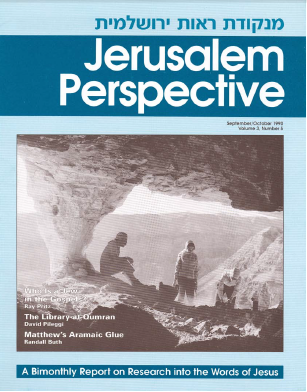The Bible Society’s modern Hebrew translation of the New Testament has not automatically translated Ἰουδαῖοι (Ioudaioi) as יְהוּדִים (ye⋅hū⋅DIM, “Jews”) in every case. It has taken into account both the internal context in which Ioudaioi occurs and the external context in which the New Testament was written.
Roots of Judah
Judah (יְהוּדָה, ye⋅hū⋅dāh) comes from a root meaning to praise, thank, or sometimes, confess, and was the name of Jacob’s fourth son. Judah’s mother Leah gave him that name because, she said, “This time I will praise the Lord” (Gen. 29:35).
The family of Judah was allotted a portion of land when the Israelites crossed over into Canaan, and that allotment was also called Judah. The Greek form of the place name is Ἰουδαία (Ioudaia), which we know in its Latinized form of Judea. A person who came from that area became known in Hebrew as a יְהוּדִי (ye⋅hū⋅DI), the plural of which is יְהוּדִים (ye⋅hū⋅DIM). The Greek transliterations of these words are Ἰουδαῖος (Ioudaios) and Ἰουδαῖοι (Ioudaioi). At the simplest level, then, a person from Ioudaia is an Ioudaios.
The word Ioudaios/Ioudaioi occurs in the Gospels eighty-eight times, and in all of the New Testament almost 200 times. The frequency of usage in each of the four Gospels is instructive: Matthew five times, Mark seven times, Luke five times, John seventy-one times. Apparently John, who was dealing with the same basic events, the same people and the same time period, must have been using the word differently from the other evangelists.
Geographical Distinctions
There were recognized geographical distinctions in the Land of Israel. People from the Galilee were called Galileans by those from the south, who were called Judeans by their northern brothers. By the time of the New Testament, however, not only were the Jewish people living all over the Land of Israel, but the great majority of them were scattered throughout the Mediterranean lands and eastward into Persia. In these lands they were generally known as Ioudaioi or its local equivalent, and even in Israel the Roman authorities and other foreigners tended to call them by this more inclusive name.
It is significant that John was writing his Gospel outside the Land of Israel. Geographical distinctions often lose their meaning when the speaker is removed from the immediate vicinity. We might imagine, for example, a Mississippi-born American ambassador to a Latin American country finding the words “Yankee Go Home” painted on the wall of his house. Inside the U.S.A. no one would call him a Yankee, but outside the country the usage is completely understandable. John was aware of the geographical distinction between Galilee and Judea and sometimes made that distinction himself, but he could also use Ioudaioi in its more inclusive sense.
In John 7:1 we read that Jesus was staying in Galilee; he chose not to go into Ioudaia (Judea) because the Ioudaioi were trying to kill him. How should we translate the word Ioudaioi in this verse? The distinction made in the text is between the Galilean region inhabited by Galilean Jews, and the Judean region inhabited by Judean Jews. Our translations should maintain this distinction and say something like, “He did not want to go into Judea because the Judeans were looking to kill him.”
Similarly we have what appears to be a geographically-rooted use of the word in John 11:7-8. “Jesus said to his disciples, ‘Let us return to Ioudaia.’ The disciples said, ‘Rabbi, not long ago the Ioudaioi tried to stone you, and you’re going back there?’” Here again the context demands that we translate (actually transliterate) “Judeans.” Unfortunately most English translations—with the exceptions of Today’s English Version and The Living Bible—have used the word “Jews” here.
Collective Usage
Another usage of the word Ioudaioi, particularly in the Gospel of John, is as a reference to certain Jewish religious leaders. It is a common linguistic practice to use the name of a whole people when speaking of a few of its representatives. Thus, for example, we would say, “The Russians beat the Americans in ice hockey.” No one would suppose that 260 million Russians and 240 million Americans went onto the ice.
In the same way the New Testament, and especially the Gospel of John, often uses the word Ioudaioi to refer to a few people in leadership or their representatives. In John 1:19 we read that “the Ioudaioi” sent some priests and Levites to question John the Baptist. Verse 24 clarifies that “they had been sent from the Pharisees.”
One of the few instances in which Jesus himself actually uses the word is found in John 13:33: “…as I said to the Ioudaioi, ‘Where I am going you cannot come.’” However, we find in John 7:30-34 that he was speaking to officers who had been sent by chief priests and Pharisees.
Responsible Translation
The good translator is not just a person who has learned Greek grammar and can use a dictionary. Responsible translation demands working with the text in the framework in which it was written.
In this case, for example, we should recall several historical factors which will have influenced John’s use of language. John wrote his Gospel near the end of the first century in the area of Asia Minor, well outside the Land of Israel. By the time he wrote, the Temple had been destroyed and much of the social structure of the Jewish people in the Land had been radically changed from what it had been in Jesus’ time. Most of the sects and parties that had been active at the start of the century no longer existed, and the only significant groups to still maintain their identity were the Pharisees and John’s fellow believers in Jesus.
Writing at the end of the century and for a mostly non-Jewish audience outside the Land of Israel, John could quite naturally use Ioudaioi and Pharisees interchangeably.
To read the next article in the “New Testament in Modern Hebrew” series, click here.

Paid Content
Premium Members and Friends of JP must be logged in to access this content: Login
If you do not have a paid subscription, please consider registering as a Premium Member starting at $10/month (paid monthly) or only $5/month (paid annually): Register
One Time Purchase Rather Than Membership
Rather than purchasing a membership subscription, you may purchase access to this single page for $1.99 USD. To purchase access we strongly encourage users to first register for a free account with JP (Register), which will make the process of accessing your purchase much simpler. Once you have registered you may login and purchase access to this page at this link:

































































































